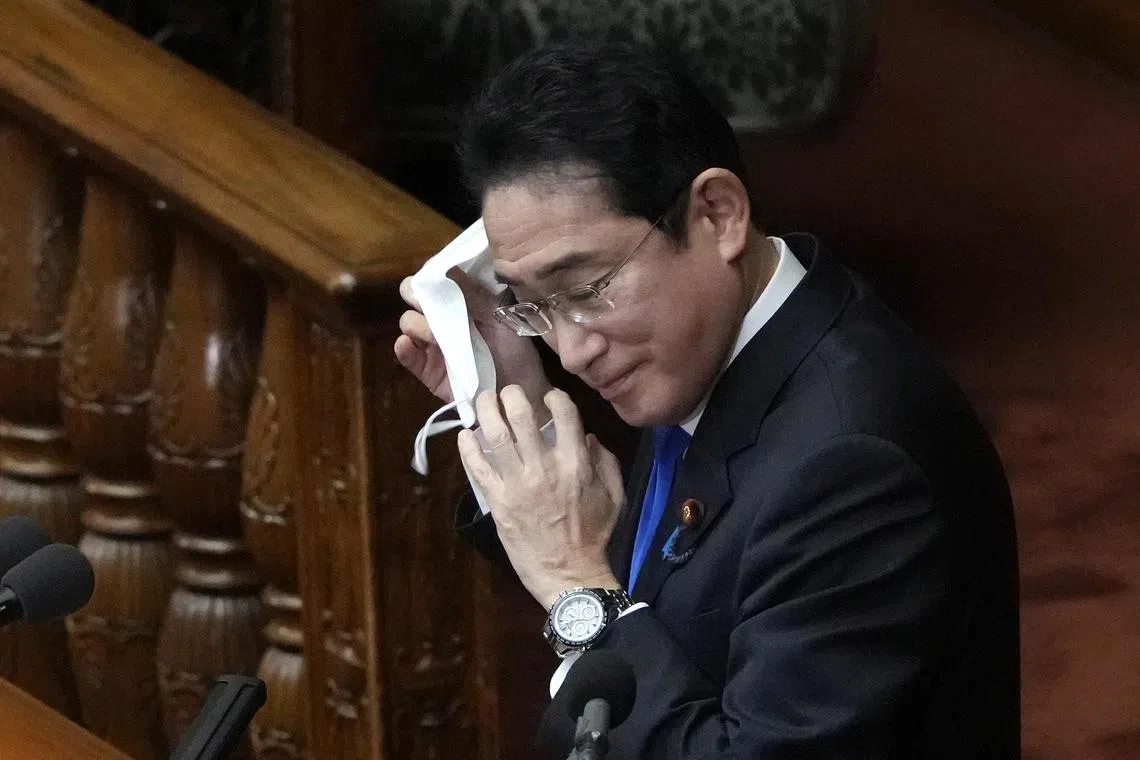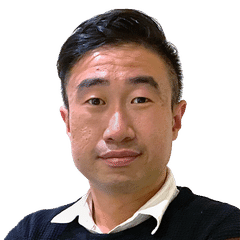Japan PM Kishida vows to tackle twin issues of security and falling births
Sign up now: Get insights on Asia's fast-moving developments

Japan's Prime Minister Fumio Kishida takes off his face mask before delivering his policy speech at the start of an ordinary session of the Diet on Monday Jan 23.
PHOTO: EPA-EFE
TOKYO – Japanese Prime Minister Fumio Kishida vowed to tackle the two existential threats to his country – security and falling births – in a policy speech on Monday.
Describing Japan as being at the crossroads of history, he said that unprecedented steps must be taken as “our responsibility to future generations”.
He spoke for 45 minutes in a customary address to open the year’s ordinary session of the Diet, as Japan’s Parliament is known. In a symbolic gesture to signal his intent to relax Covid-19 rules
He said that a “sea change” in defence policy
Japan will more than double its five-year defence budget to 43 trillion yen (S$434.6 billion) starting April 2023. Among the planned big-item purchases are counterstrike capabilities that will allow Japan to attack enemy bases.
Mr Kishida admitted that it was a radical shift from its pacifist posture, but stressed that Japan will act within the framework of the Constitution and international law.
“I’d like to emphasise that Japan’s Three Non-Nuclear Principles (not possessing, not producing and not permitting nuclear weapons), defence-oriented posture and our path as a peaceful nation remain unchanged,” he said.
He further warned that Japan was “on the brink of social dysfunction”, and that it was “now or never” for the world’s greyest society to reverse a trend of falling births.
Childbirths in 2022 were estimated to have fallen below 800,000 for the first time in recorded history
Japan’s population, which has been shrinking since 2010, was estimated at 124.77 million on Jan 1, 2023, down 0.43 per cent from a year earlier.
Mr Kishida vowed “unprecedented” steps that far exceed the scope of past governments, saying: “We must recognise child-rearing support as our most important policy, in thinking about the sustainability of our nation’s economy and society.”
Despite dangling cash bonuses and benefits, studies have shown that Japan remains one of the world’s most expensive places to raise children.
“Children and childcare are the most effective investments for our future,” he said, noting the three broad pillars of financial support, enhanced childcare services and work-style reform, with more details on funding to come in a policy outline in June.
A new Children and Families Agency will be launched in April to coordinate children-related policy that has, until now, been hamstrung by ministries operating in silos.
The threats to security and falling births are related: Even as Japan fears a future where its creaking social security system will collapse, its military, the Self-Defence Forces (SDF), is already struggling to hire enough people.
The SDF has not met recruitment quotas since 2014, and is about 16,000 personnel short of its desired headcount.
Mr Kishida’s government has previously mooted tax hikes to fund the increased outlay in defence and childcare, even as the idea is extremely unpopular
While he did not directly broach the topic on Monday, he said: “We, who live now, should respond to the need for funding as our responsibility, rather than pass on the matter to future generations.”
In his speech, he repeated his calls for businesses to raise wages
He said he will propose a model to transition to merit-based pay, from current seniority-based systems, by June, while also supporting start-ups to catalyse innovation.
Japan is playing catch-up on this front. A tally of unicorn start-ups, defined as private firms valued at least US$1 billion (S$1.3 billion) by business analytics firm CB Insights, showed 651 from the United States, 172 from China, 15 from South Korea, 14 from Singapore, but just six from Japan.
Mr Kishida proposed a new credit system to allow entrepreneurs to raise funds more easily, and an immigration programme to lure foreign talent.
With Japan holding the rotating presidency of the Group of Seven bloc of industrialised democracies this year, he vowed to take the lead on international responses to crises such as the Russia-Ukraine war.
He added that Japan will seek a “constructive and stable relationship” with China, and regards South Korea as an “important neighbouring country”.



